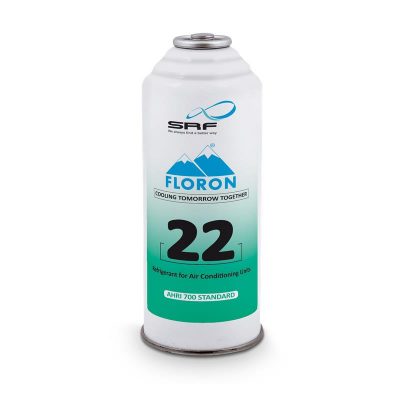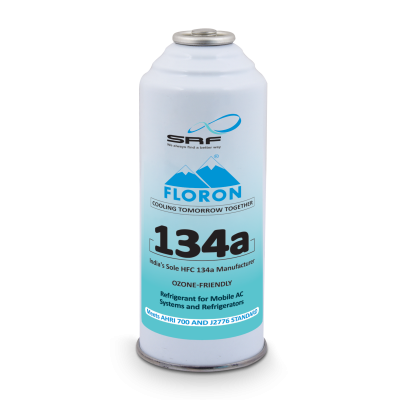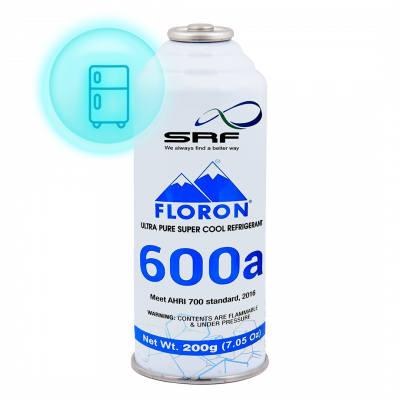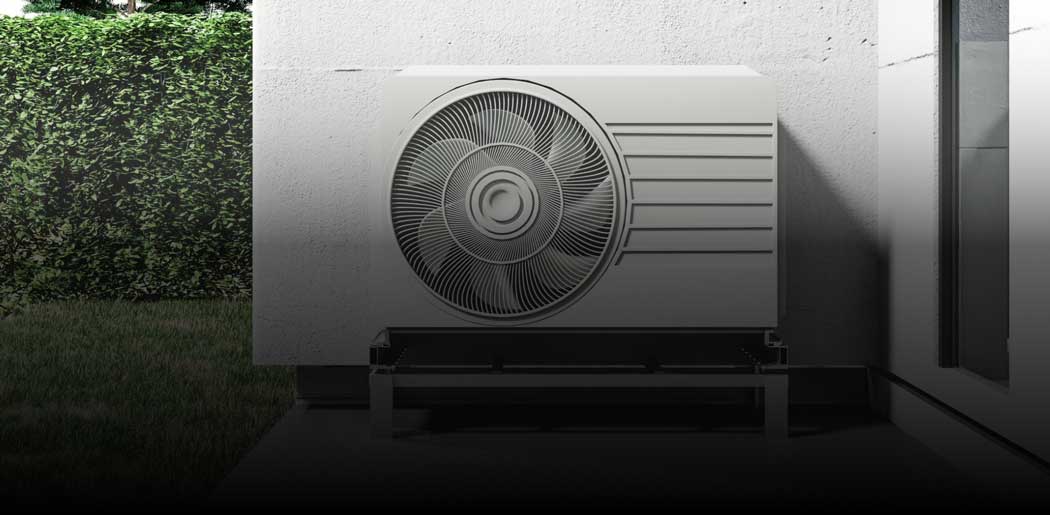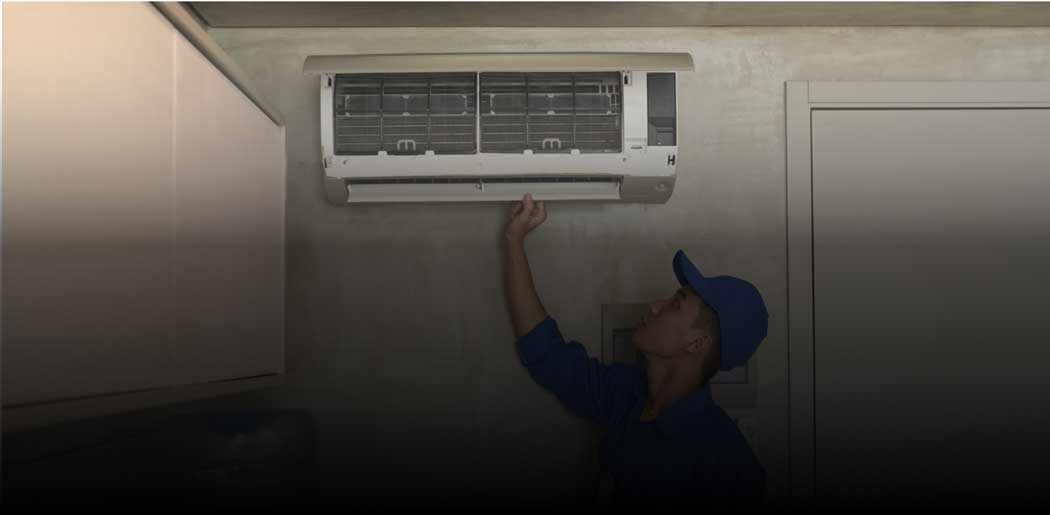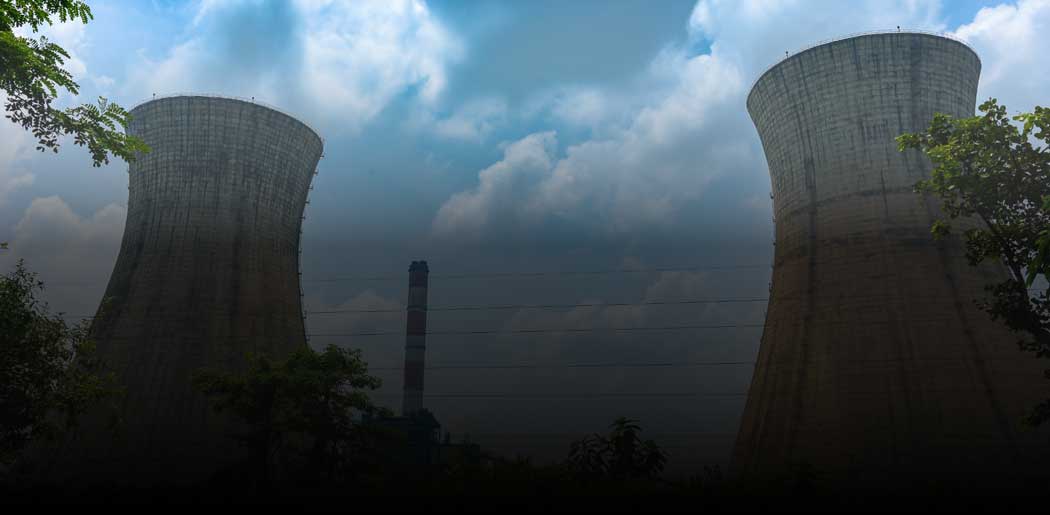
The Purest Cooling Gas-Refrigerant.

So Should You!

trust your refrigerator with.

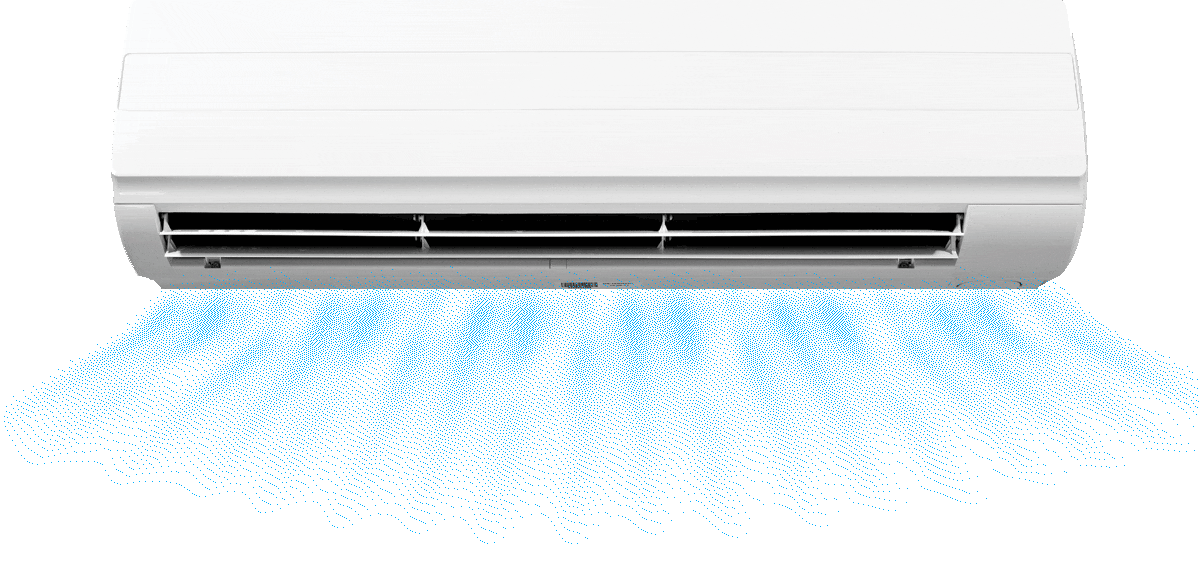
What Is A CoolingGas-Refrigerant?
A cooling gas – refrigerant is the generic term for the chemical blend that cycles through an air conditioner.
- Cooling gas – refrigerants absorb the heat from a room/car/refrigerator and flow through the compressor, increasing the refrigerant’s pressure.
- Next, the cooling gas – refrigerants flow through the condenser, where it condenses from vapor to liquid form, giving off heat.
- Then, it goes through the expansion valve, where the pressure drops.
- Finally, the cooling gas – refrigerants reaches the evaporator, which evaporates due to the heat. The evaporator draws heat from the region that is to be cooled.
- The vaporized cooling gas – refrigerants return to the compressor to restart the cycle.
What Is A GoodQuality CoolingGas-Refrigerant?
Just as blood is vital for the human body, refrigerant is essential for your AC's well-being. It acts as the life source that regulates the temperature. Just as contaminated blood can make you sick, mixed gas can harm your AC.
Good quality cooling gas-refrigerant is the appropriate fuel for your AC to ensure proper cooling, longer life of ACs, and reduction in electricity bills. They usually have favorable thermodynamic properties, are non-corrosive, and are safe i.e. non-toxic and inflammable.
What Is a Mixed Cooling Gas-Refrigerant?
Mixed or fake gas is a contaminated blend of cooling gas – refrigerants that can cause rust and leakage in your room air conditioner and car air conditioner, ultimately leading to inefficient cooling and damaged parts.
How is Mixed Gas killing Your Room AC/Car AC/ Refrigerator
Machine Failure
When the compressor has incorrect gas, it will experience corrosion and leakages
No Cooling
Mixed gas would reverse the cooling gas – Refrigerants’ cooling effect, lowering performance.
Fire and Explosions
Mixed gases are a blend of contaminated chemicals that may be toxic and inflammable
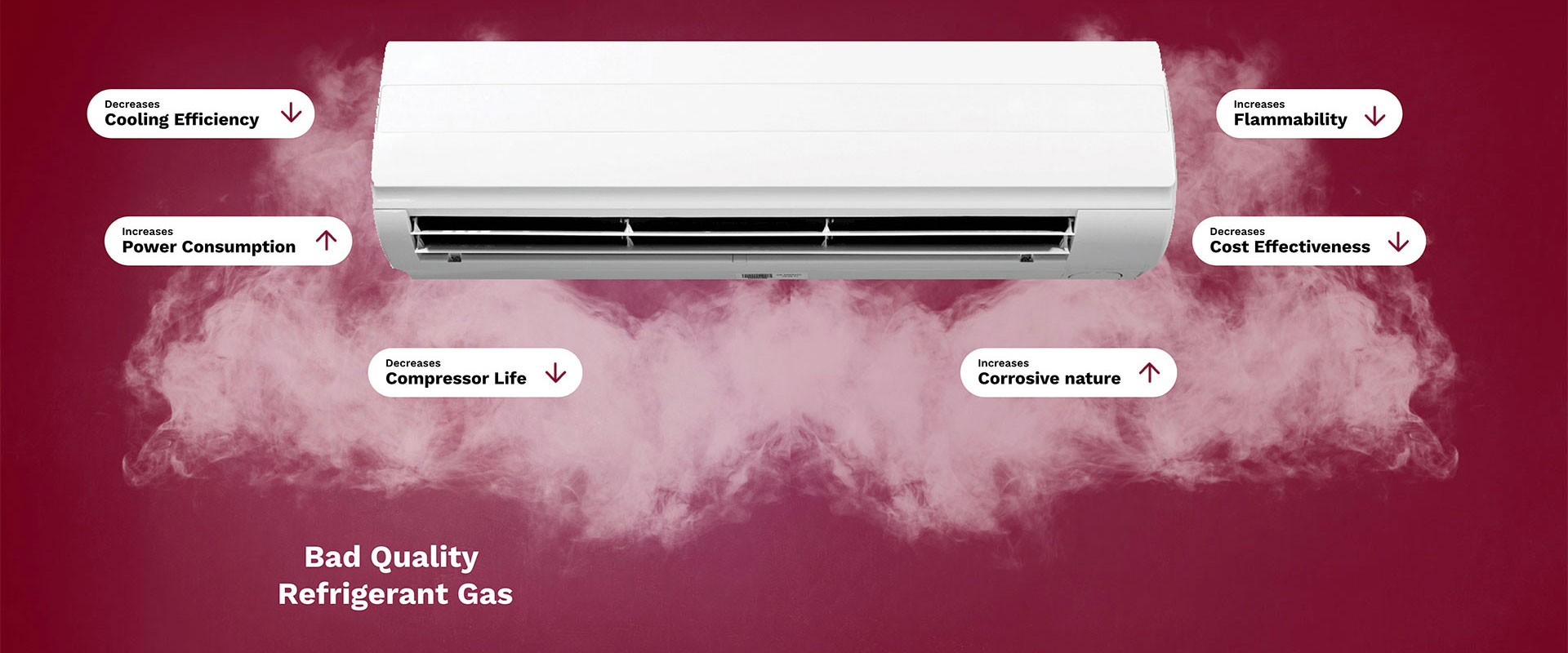
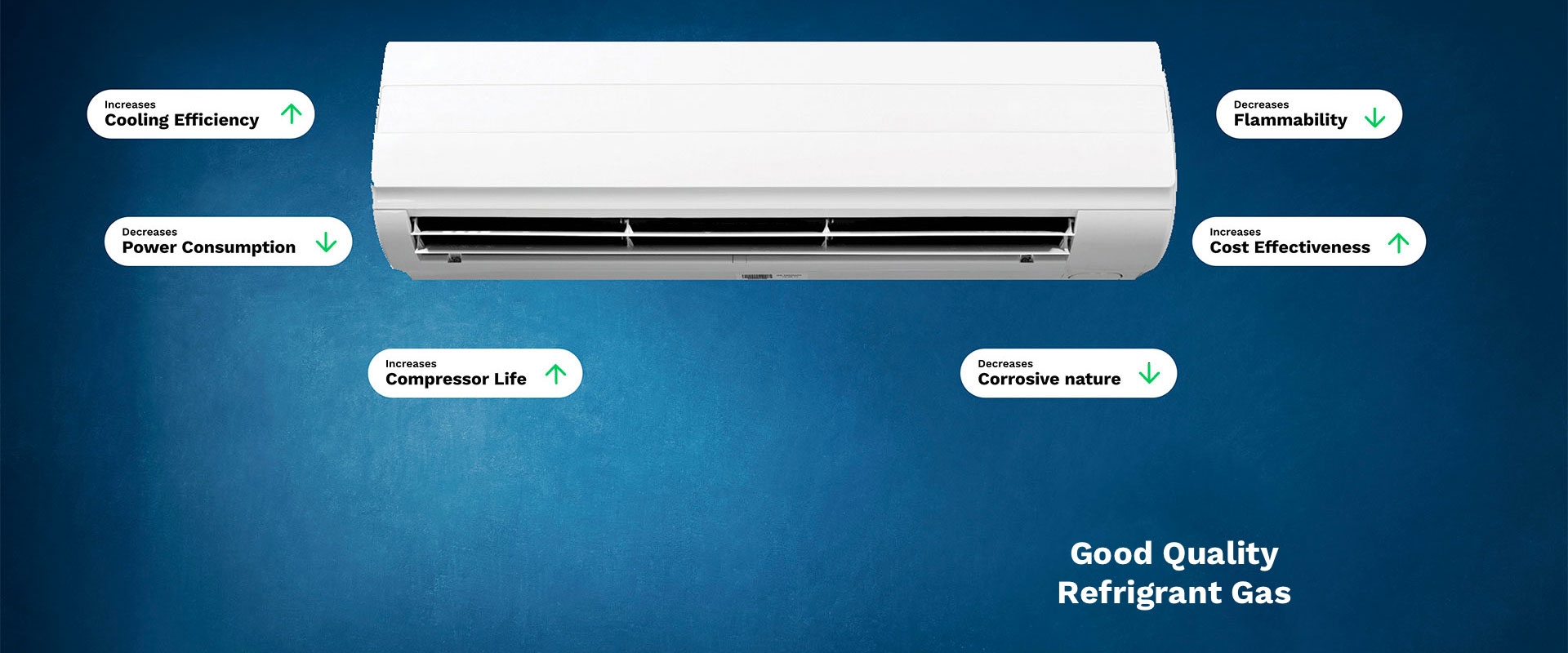
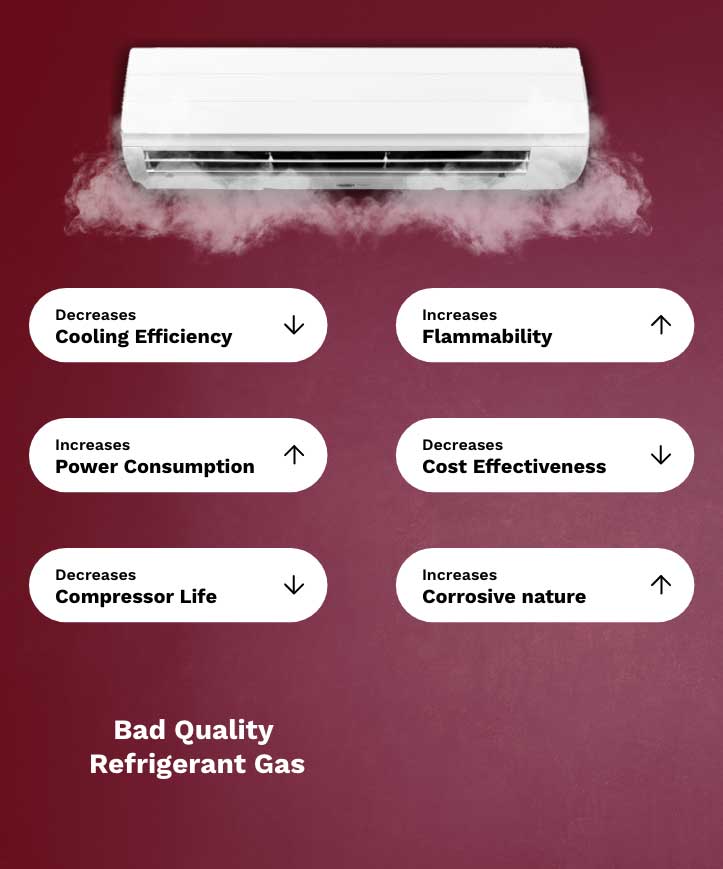
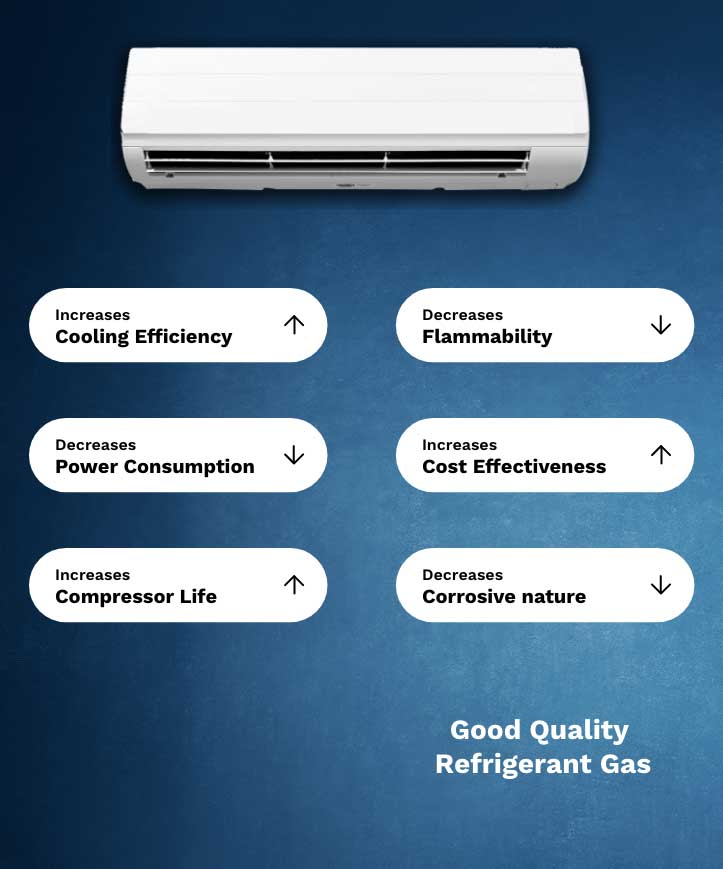
Be The Smart Customer
Know the difference between Myths and Facts when it comes to the cooling gas-refrigerant
-

The compressor is responsible for the cooling!
Most people blame the compressor for inadequate cooling, which is far from the truth. The compressor is responsible for converting the cooling gas – refrigerant from a cool, low-pressure liquid to a hot high-pressure gas and vice versa. Even the newest and most technologically advanced compressor could get damaged with Mixed gas over time.
-

You have to refill the cooling gas – refrigerants every year!
As something that circulates in the Room/ Car AC or refrigerators constantly, cooling gas – Refrigerants only need to be refilled in case of leakage. If you experience decreased cooling, an overworked compressor, and frost or ice buildup on the evaporator coils, it’s time to fix the leak that might have been caused by mixed gas.
-

Cooling gas – refrigerants do not affect energy consumption!
Responsible for the cooling effect, cooling gas – refrigerants are directly related to your home, car or refrigerator’s AC’s energy consumption. Mixed gas or lack of enough refrigerant would increase the load on your compressor, resulting in higher energy consumption. In simpler words, if your appliance is taking more time than usual to cool, your energy consumption will go up!
-

My appliances can function without cooling gas-refrigerant!
Without cooling gas-refrigerant, your appliance would not fulfill their primary functioning, i.e., cooling. Room AC/Car AC/Refrigerator, as a machine, might work for a bit but it will blow hot air instead of cool. In the long run, it could cost you energy and money. It may also lead to replacing the appliance.
Be the smart Consumer
Know the difference between Myths and Facts when it comes to the cooling gas-refrigerant
The compressor does the cooling in an AC!
Most people blame the compressor for inadequate cooling, which is far from the truth.
The compressor is responsible for converting the cooling gas – refrigerant from a cool, low-pressure liquid to a hot high-pressure gas and vice versa. Even the newest and most technologically advanced compressor could get damaged with Mixed gas over time.
You have to refill the cooling gas – refrigerants every year!
As something that circulates in the AC constantly, cooling gas – Refrigerants only need to be refilled in case of leakage.
If you experience decreased cooling, an overworked compressor, and frost or ice buildup on the evaporator coils, it’s time to fix the leak that might have been caused by mixed gas.
Cooling gas – refrigerants do not affect energy consumption!
Responsible for the cooling effect, cooling gas – refrigerants are directly related to your AC’s energy consumption. Mixed gas or lack of enough refrigerant would increase the load on your compressor, resulting in higher energy consumption.
In simpler words, if your AC is taking more time than usual to cool, your energy consumption will go up!
ACs can function without cooling gas-refrigerant!
Without cooling gas-refrigerant, ACs would not fulfill their primary functioning, i.e., cooling. AC, as a machine, might work for a bit but it will blow hot air instead of cool. In the long run, it could cost you energy and money. It may also lead to changing the AC.
FLORON by SRF
With a global distribution network, SRF offers a wide range of refrigerants suitable for different needs of HVAC (Heating, Ventilation and Air Conditioning) applications. Refrigerants are primarily used in applications such as room air-conditioners, automobile air conditioners, refrigerators, and chillers. Marketed under the FLORON® brand, SRF is the only Indian manufacturer of ozone-friendly refrigerants such as F 134a and F 32. The company also manufactures HFC blends such as F 410A and F 407C. We continue to manufacture HCFC 22 under the brand FLORON-22 for use both as a refrigerant and as a feedstock for pharma and agrochemical customers apart from producing Poly Tetra Fluoro Ethylene (PTFE). The technology to produce refrigerants F 134a and F 32 has been developed by SRF in-house. With the addition of F 125, SRF is now the largest producer and seller of refrigerants in India and has further consolidated its market leadership. SRF is one amongst the very few fully backward-integrated players in this space. This not only allows us greater control on product quality but also makes us a very competitive producer.
SRF’s Fluorochemicals Business holds the status of being a refrigerant supplier of choice with pride, serving customers in more than sixty countries worldwide. Today, besides a wide range of other Stock Keeping Units (SKU), SRF’s F 134a and F 22 refrigerants are available in smart, easy-to-use cans. In fact, our F 134a cans can also be bought from the shelves of some leading retailers in the United States.
PRODUCT RANGE
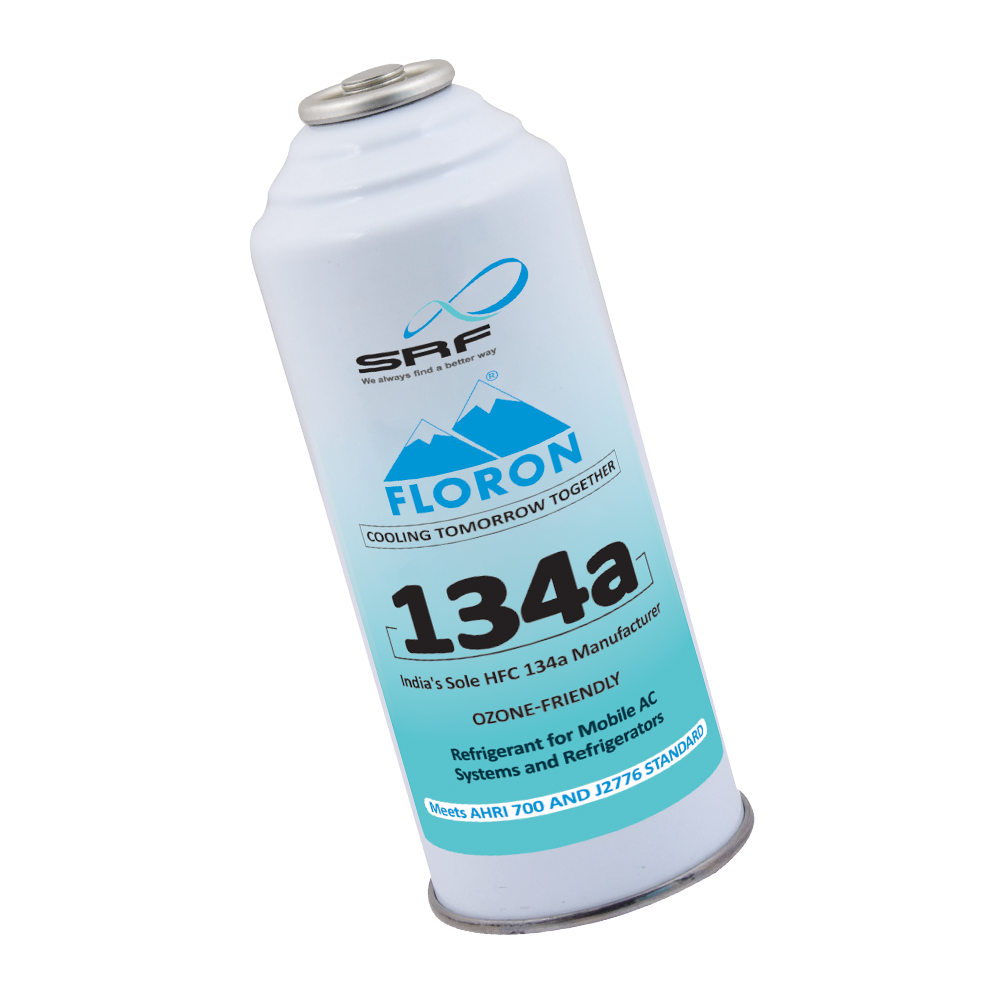
R 134a (chemical designation: 1,1,1,2-tetrafluoroethane) is a hydrofluorocarbon HFC. Its desirable properties makes it an increasingly popular refrigerant in Automotive A/C systems.
Available Sizes:
340g, 450g, 10kg, 62kg, and 825kg.
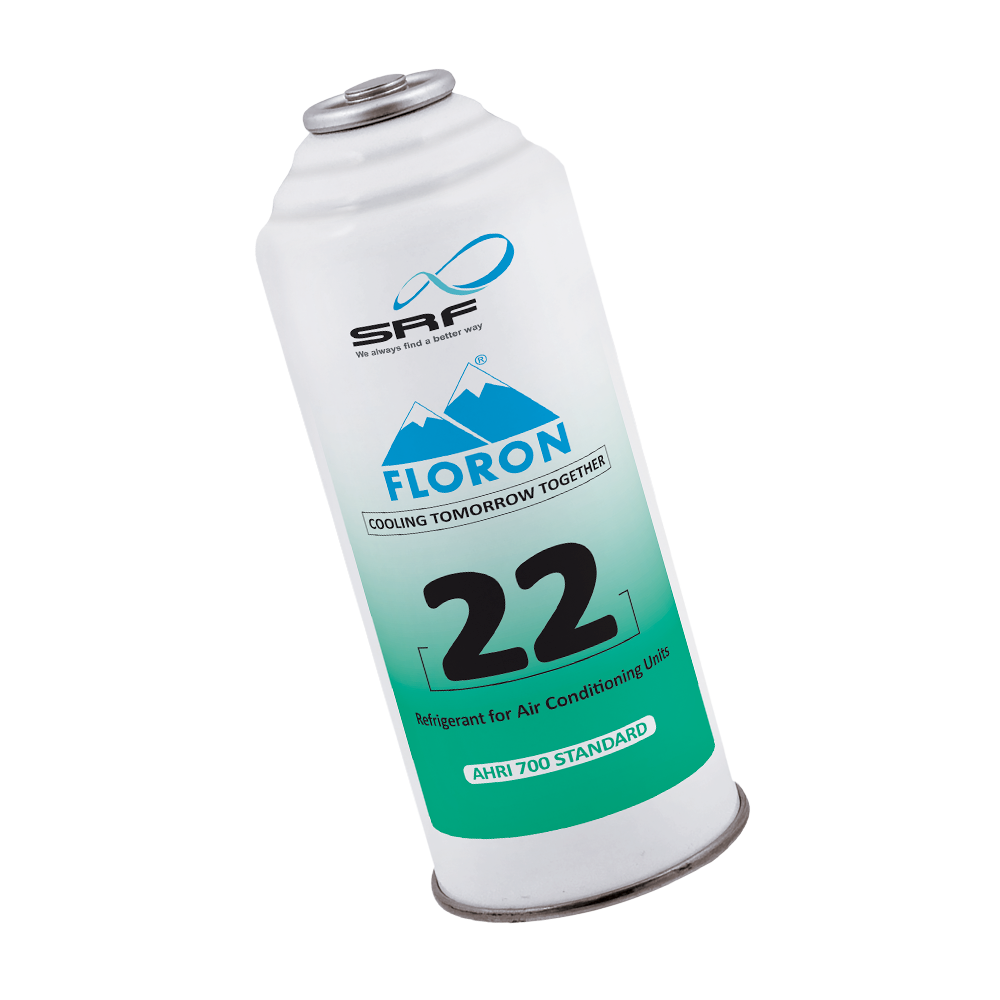
R 22, a common form of the HCFC-22 chemical, is a refrigerant used for cooling air in air conditioning system as well as in Industrial Chillers. A refrigerant is a substance used in a heat cycle that undergoes a phase change between gas and liquid to allow the cooling in an AC.
Available Sizes:
420g, 5kg, 10kg, 61kg, 825kg.
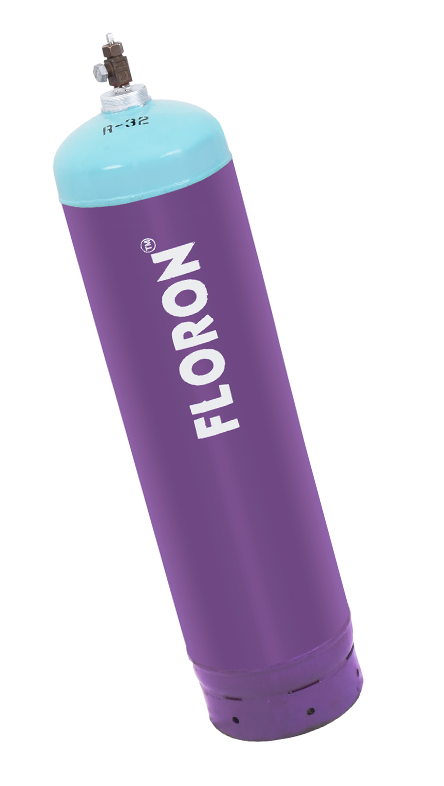
R 32 is the most balanced refrigerant in terms of environmental impact, energy efficiency, safety, and cost-effectiveness. It is one of the only ozone-friendly refrigerants manufactured in India. It is used in Residential Air conditioners.
Available Sizes:
8kg, 40kg, 710kg.
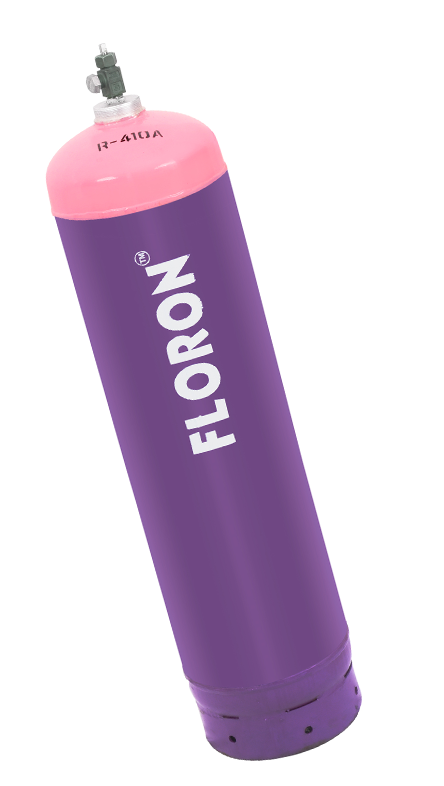
F 410A is an HFC blend which is used in Residential Air Conditioning Systems Commercial Air Conditioning Systems.
Available Sizes:
9kg, 40kg.
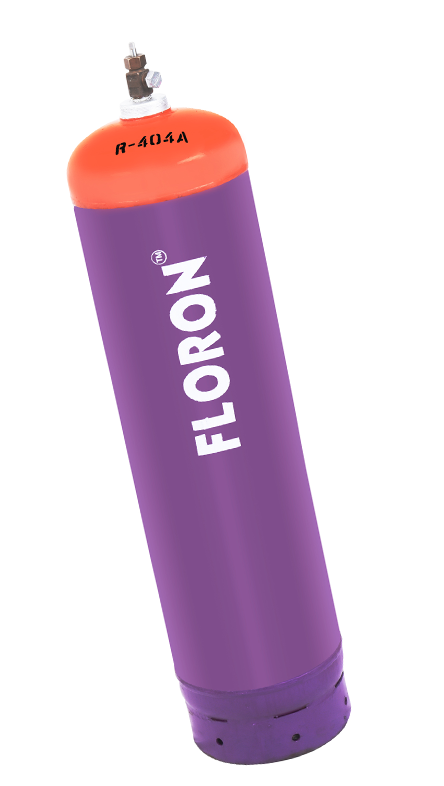
F 404A is an HFC blend that is used in Commercial Refrigeration.
Available Sizes:
7kg, 40kg, 625kg.
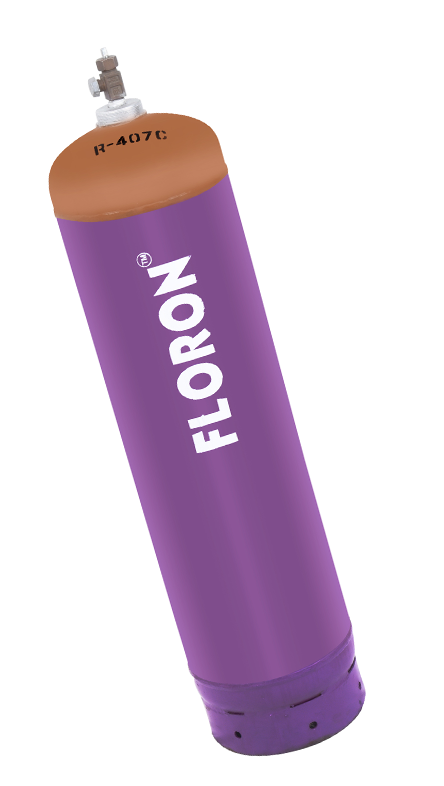
F 407C is an HFC blend that is used in Light commercial air conditioners.
Available Sizes:
7kg, 45kg, 800kg.
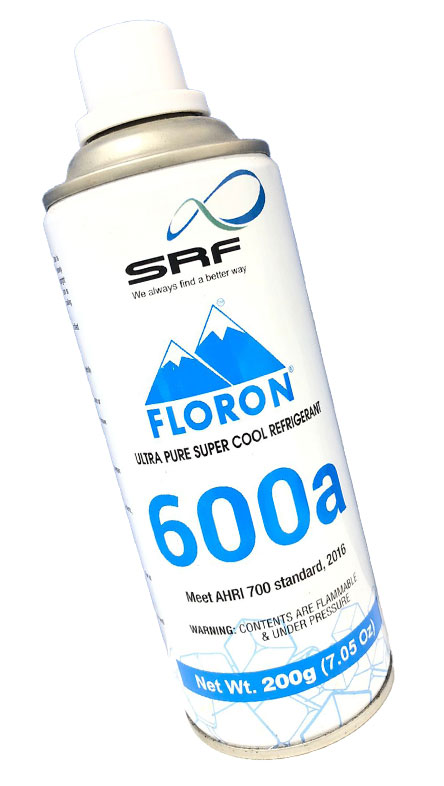
R 600a (isobutane) is a popular hydrocarbon due to its low Global Warming Potential (GWP). It is the refrigerant of choice for domestic and light commercial refrigeration units, including fridges and freezers, drink dispensers and standalone display units.
Available Sizes:
200g, 30kg, 430kg.
Supertron Braze is a high-quality gas for brazing of Copper tubes used in AC, fridge.
Available Sizes:
User-friendly can of 225g.
Testimonials
I was struggling with the AC cooling during summers. No matter what the brand was, the cooling was just not effective. Then a very good AC technician told me about pure cooling gas – refrigerant or AC gas as we know it. Trust me, even old ACs are now working wonders!
Arun Verma
NO MATTER WHAT THE AC BRAND IS IT HAS SRF FLORON REFRIGERANT!
I wish to express my satisfaction with the service you and your company have provided. It’s not often the case when a service is employed that the terms are met with such integrity. The convenience of the service you provide is also worthy of praise too.
Mr. Vijay Mathur
I can’t praise SRF enough for going above and beyond in helping me with honest, reliable advice for my refrigerator. They have provided with fast, reliable service and are very helpful and knowledgeable. They make good quality gas for refrigerators, ACs etc which makes all the difference.
Nidhi
Thank you for putting SRF Quality Gas in my Car AC. I just wish I knew that the Gas used in Car AC has brands. SRF Gas has transformed my Car AC from being barely working to being totally effective!
Shelly
The Consequences of Mixed Gases
How a small component can create unfortunate results.
Man and two-year-old son killed in AC blast at Ahmedabad home
A 45-year-old man and his two-year-old son were killed after an air conditioner exploded in their flat.
Three workers killed in AC blast at RCF unit in Maharashtra’s Raigad district
Three workers died and as many were injured after an air-conditioner compressor exploded at Rashtriya Chemicals and Fertilisers (RCF) plant at Alibag.
Tamil Nadu: 28-year-old man dies in AC explosion in Chennai
A 28-year old man found dead after an AC blast in their house
AC blast kills two
Two men died due to an explosion that occurred in an air-conditioner unit they were attending to at a private firm in Guindy.
Bursting of an AC compressor in a private hospital in Indore injured 10 people
10 people seriously injured and 2 critical after an AC blast in the general ward of a hospital in Indore
AC Explodes In Kanpur, Mechanic Killed
A mechanic from his helper was injured when a air conditioner suddenly exploded while it was being opened for maintenance here on Wednesday.
Blast during repair of air conditioner in Jaipur, Mechanic died
A Mechanic in Jaipur died after the compressor burst while servicing the AC
FAQs
A cooling gas-refrigerant is the generic term used for the chemical blend that cycles through the compressor of an AC that takes the heat from a room, car or refrigerator and throws it out in the atmosphere.
Air conditioning or refrigeration is a cyclical process. A refrigerant absorbs the hot air in a room and converts from a low-pressure gas to a high-pressure liquid. Air conditioning components send the refrigerant outside through a fan. The refrigerant then cools down and gets converted into a low-pressure gas. This gas is circulated throughout the room or the refrigerator making it cool. This cycle repeats.
The most common types of cooling gas-refrigerant used in AC are:
- Chlorofluorocarbons (CFCs): Refrigerants that contain Chlorine, Fluorine, and Carbon
- Hydrochlorofluorocarbons (HCFCs): Refrigerants that contain Hydrogen, Chlorine, Fluorine, and Carbon
- Hydrofluorocarbons (HFCs): Refrigerants containing Hydrogen, Fluorine, and Carbon
Never. A refrigerant circulates in the compressor over and over again. You might have to replace the refrigerant only if there is a leak. So if your AC technician tells you that you need more refrigerant, ensure that they locate the leak too.
There could be various reasons behind an AC giving a low cooling performance. Lack or low quantity of cooling gas-refrigerant is the most common reason behind the low cooling efficiency of an AC. When your AC fails to cool, it may mean that the level of this gas has become insufficient or there is a leak in the unit. A clogged AC filter could also lead to low cooling performance. So you must clean the filters once a month.
According to studies from the mid-1980s, it became evident that the then most commonly used AC cooling gas-refrigerant – CFCS (chlorofluorocarbons) and HCFCs (hydrochlorofluorocarbons), had damaging effects on the ozone layer. Carbon emissions are largely responsible for the depletion of the ozone layer, and CFCs are composed of chlorine, fluorine, and carbon.
Discover Our Cooling Secrets: Watch Now!
100% pure refrigerant
One of the leading manufacturers of Ozone-friendly refrigerant HFC 32 in India
The only manufacturer of Ozone-friendly HFC 134a in India
Trusted by Home and Car AC manufacturers
Most trusted brand in 60+ countries
OEMs & more than 250 dealers pan India
Copyright 2024 @ SRF I All Rights Reserved


